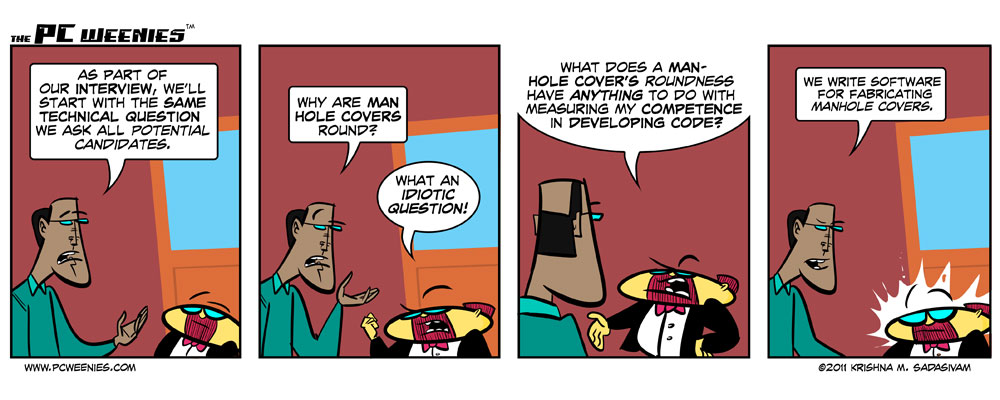Technical Interviews Redux
If you’ve been on a technical interview, there’s a good chance you’ve been asked to solve a puzzler. Answering the puzzler correctly can give an employeer some insight into how well you can think on your feet – but it does nothing to assess one’s aptitude towards getting the job done.
I’m of the mind-set that these types of questions bear little relevance to determining whether or not a person would be a good fit for a technical job. And apparently, I’m not alone. Jon Evans, writer for TechCrunch, echoes my sentiments. And this isn’t the first time I’ve tackled the subject…
So… what do you think about the current technical interview process? Is it effective? Or does it just tell an employer how well you can solve puzzles? Sound off below!
-Krishna





Bartimaeus
May 10, 2011 at 2:47 amNo idea about the interviews, but manhole covers are round because, unlike, say, a square manhole cover, a round cover cannot be tipped in such a way that will cause it to fall into its own hole.
Dan Greenberg
May 10, 2011 at 8:55 amAh, @Bartimaeus beat me to the answer.
In terms of “puzzler” interviews: I’ve been on both sides of “case” interviews… which is the same thing for business jobs like consulting. I can therefore offer some insights.
A case interview, done properly, is much more about seeing how the person thinks and how s/he presents her/himself. (You can blow a case interview by getting the right answer but presenting it in an obnoxious way.) Therefore, a good case has a lot of subtle ways it can go and not a simple “trick” that you either get or you don’t… and a good case interviewer will encourage you to explore as many of those subtleties as time allows. A bad case has a simple binary answer and a bad case interviewer is looking for only that. (And then there are sadistic interviewers who like to watch you flounder around while you see your chances of getting the job fade. But, in those cases, you should realize you did not want to work for that guy anyway.)
Summary: It all comes down to the interviewer and his/her choice of case. Done correctly, a case interview is incredibly predictive of how someone will do on the job. Done incorrectly, a case interview is incredibly predictive of how little fun you’ll have even if you get the job.
Kevin Rubin
May 10, 2011 at 7:07 pmI’ve been in a similar situation… In the mid-90’s I was interviewing for a job at Portland General Electric, something in IT or software development (I don’t even remember anymore). The interview was only going so-so and one of the three interviewers said it was time for some nonsense questions to see how I’d react to them.
The first one asked was why manhole covers are round, and I gave the same answer as @Bartimaeus. But I also pointed out, “but in this company that probably isn’t nonsense at all, most of the manhole covers around here are yours.” One of them then said, “you know, he’s right, that is a relevant question for us…” and they all agreed.
I didn’t get the job, though…
Steve
May 11, 2011 at 6:25 pmAt my interview for my current job, they thankfully only asked relevant technical questions. I was a bit surprised that the interviewer seemed genuinely surprised/pleased when I answered the somewhat simple questions successfully, I later found out that most of the other candidates either had no experience or had too much experience and would have required too high of a salary.
Jim
May 20, 2011 at 3:06 amBartimaeus makes a typical error, confusing “why” with “what results from”. In no way are manhole covers round because square ones could slip down the hole, but that is certainly an added benefit.
Manhole covers are round because they sit on top of manholes (pipes) that are round. And that manholes are round has nothing to do with making it hard for covers to fall down them and everything to do with fluid dynamics and ease of assembly.